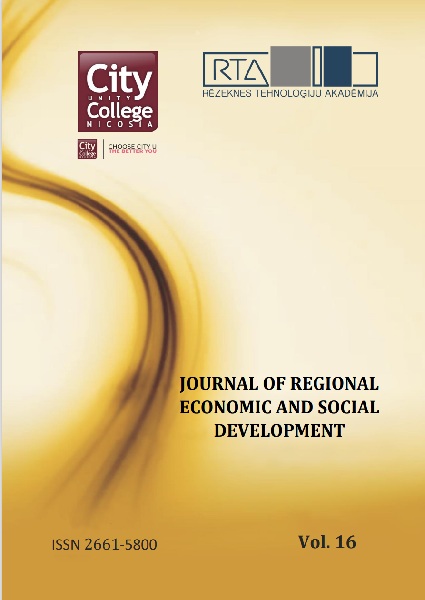ENHANCING THE PAYMENT SYSTEM IN UZBEKISTAN
DOI:
https://doi.org/10.17770/jresd2024vol16.8291Keywords:
artificial intelligence, cash, fintech, payment system, UzbekistanAbstract
Purpose and aim of the study: To explore Uzbekistan's payment system and make suggestions for improving the payment system of Uzbekistan.
Design / Methodology / Approach: The research employed the following methods: descriptive and logical construction were used for reviewing and analyzing research papers and other information sources, as well as for scientific discussion. The graphic method was applied to better represent and compare the research results.
Main Findings: Modern payment systems are an important part of the global economy. The payment system in Uzbekistan is changing as a result of legislative changes and the growing use of digital payments. To reduce fraud and boost security in Uzbekistan's payment system, it is essential to use cutting-edge technology and strong legal frameworks. The integration of artificial intelligence in Uzbekistan's payment systems offers immense potential for improving fraud detection, transaction efficiency, and customer experience. Reducing cash circulation and promoting digital payments are critical for modernizing Uzbekistan's economy.
Originality: The research makes strategic recommendations that should increase customer trust in Uzbekistan's financial services industry and promote economic development. By putting these policies in place, the financial services industry can become stronger and more inclusive, which will improve the economy's stability and vibrancy.
Implications: The research provides a basis for further research on possibilities of improvement of payment systems.
Downloads
References
Allahrakha, N. (2024). Legal analysis of the law of the Republic of Uzbekistan "On Payments and Payment Systems", TSUL legal report, 5(1), 38-55. https://dx.doi.org/10.51788/tsul.lr.5.1./WAJR6426
Anderson, R., Barton, C., Böhme, R., & Clayton, R. (2013). Measuring the Cost of Cybercrime. Conference: Proceedings of the 11th Workshop on the Economics of Information Security (WEIS). https://doi.org/10.1007/978-3-642-39498-0_12
Barbu, C. M., Florea, D. L., Dabija, D. C., & Barbu, M. C. R. (2021). Customer experience in Fintech. Journal of Theoretical and Applied Electronic Commerce Research, 16(5), 1415–1433. https://doi.org/10.3390/jtaer1605008
Boboev, S. (2023). Deep Dive: Payments in Uzbekistan. https://samboboev.medium.com/deep-dive-payments-in-uzbekistan-f07981902911
CBRU (2020). History of the development of the payment system and computerization in the banking sector. https://cbu.uz/en/payment-systems/history/
Ganiev, E. J. (2023). The concept and features of the payment system. Web of Scientist: International Scientific Research Journal, 4(10), 29-39. https://wos.academiascience.org/index.php/wos/article/view/4375
Kayode, S. O. (2023). Revolutionizing Financial Landscapes: The Role of Emerging Technologies in Fintech Transformation.
Khando, M., Islam, S.,& Gao, Sh. (2022). The Emerging Technologies of Digital Payments and Associated Challenges: A Systematic Literature Review. Future Internet, 15, 21. https://doi.org/10.3390/fi15010021
Kolodiziev, O., Mints, A., Sidelov, P., Pleskun, I., & Lozynska, O. (2020). Automatic machine learning algorithms for fraud detection in digital payment systems. Eastern-European Journal of Enterprise Technologies, 5(9 (107), 14–26. https://doi.org/10.15587/1729-4061.2020.212830
Miah, A., Rahouti M., Jagatheesaperumal S. K., Ayyash M., Xiong K., Fernandez F., & Lekena M. (2023). Blockchain in Financial Services: Current Status, Adoption Challenges, and Future Vision. International Journal of Innovation and Technology Management, 20(08). https://doi.org/10.1142/S0219877023300045
Neverova, S. D. (2023). Problems and prospects of digitalization of the banking sector of the Uzbekistan economy. novateur publications Journal NX- A Multidisciplinary Peer Reviewed Journal. 9(4), 449-455. https://repo.journalnx.com/index.php/nx/article/download/4785/4555/9240
Noul, D. (2024). FinTech Evolution: AI-Driven Solutions for Payment Optimization and Supply Chain Dynamics. DOI:10.13140/RG.2.2.16036.69762
Papathomas A., & Konteos G. (2023). Financial institutions digital transformation: The stages of the journey and business metrics to follow. Journal of Financial Services Marketing. Advance online publication. https://doi.org/10.1057/s41264-023-00223-x
Pay10.com (2023). Common Challenges of Online Payment Processing and Solutions to Tackle Them. https://www.pay10.com/blog-Common-Challenges-of-Online-Payment-Processing.php
Poudel, O., Acharya, P., & Simkhada, D. (2023). Customers' Trust in E-payment: The Influence of Security and Privacy. BMC Journal of Scientific Research. 97-112. https://doi.org/10.3126/bmcjsr.v6i1.60958
Rahmad, N. N., Zullzaidi, N. S. M., Azmi, N.D.F., & Khairudin, N.M. (2024). Mobile Payment Security: A Critical Analysis of Vulnerabilities & Emerging Threats. TechRxiv. DOI:10.36227/techrxiv.170620372.22051414/mobile payv1
Rehman, Sh., Coughlan, J., & Halim, Z. (2012). Usability based reliable and cashless payment system (RCPS). 8(4), 2747–2759. http://www.ijicic.org/ijicic-10-10073.pdf
Saini, A., & Saha, S. (2024). Digital Finance-Fintech and its Impact on Financial Inclusion in India. International Journal of Innovative Science and Research Technology, 9(4), 2048–2057. https://doi.org/10.38124/ijisrt/ijisrt24apr2261
Siddiqui, M. K., & Goyal K. K. (2023). A Study the Use of E-Payment Systems Based on Artificial Intelligence. Artificial Intelligence and Communication Technologies, 1063-1076. https://doi.org/10.52458/978-81-955020-5-9-101
Zetzsche, D., Buckley, R., Barberis, J. N., & Arner, D. W. (2017). Regulating a Revolution: From Regulatory Sandboxes to Smart Regulation. Fordham Journal of Corporate & Financial Law. https://ir.lawnet.fordham.edu/jcfl/vol23/iss1/2/
Downloads
Published
Issue
Section
License
Copyright (c) 2024 Jakhongir Valiyev, Inta Kotāne

This work is licensed under a Creative Commons Attribution 4.0 International License.


